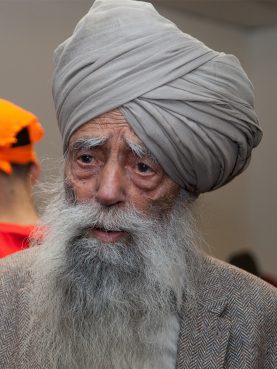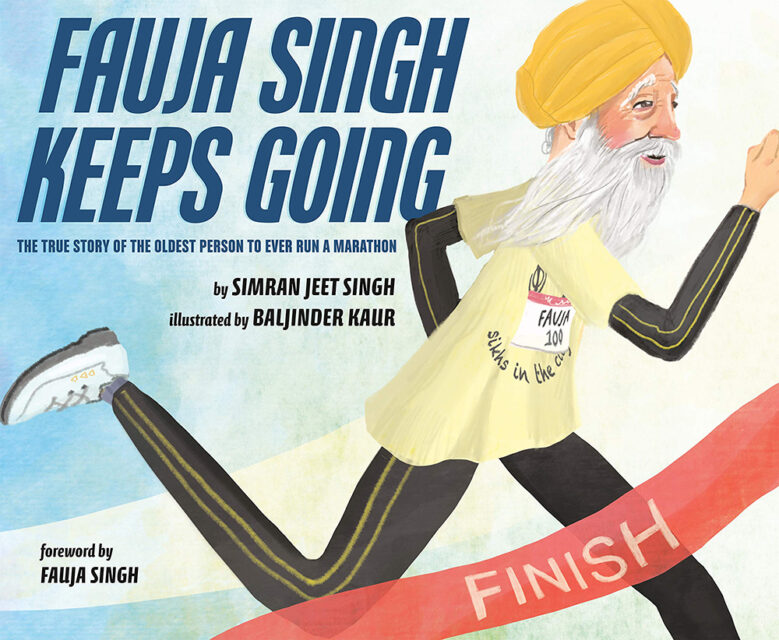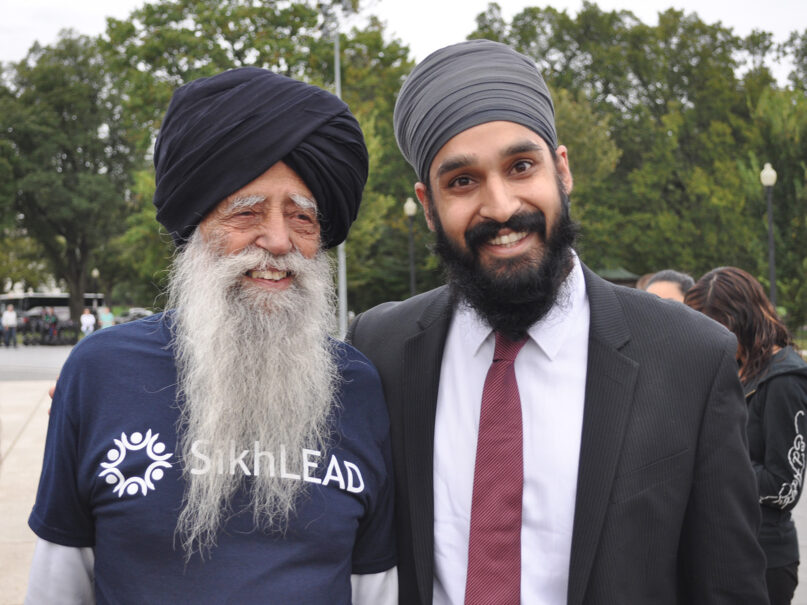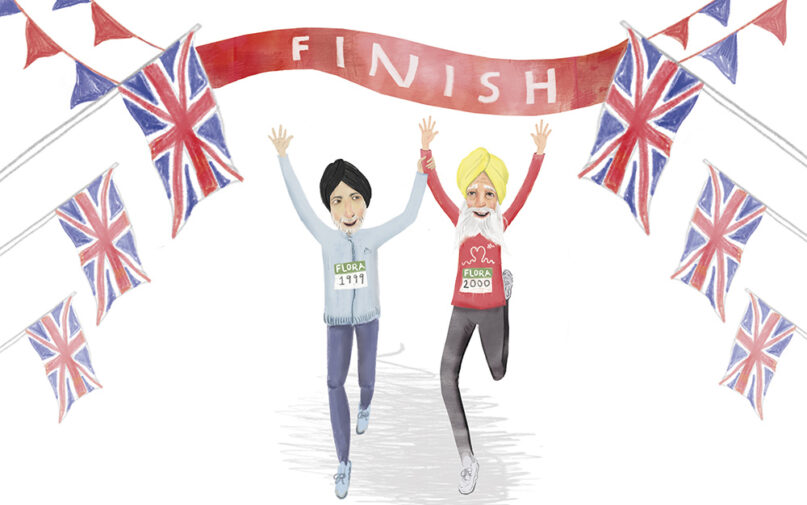
(RNS) — On July 14, 2025, a remarkable life came to a tragic end. The great Sikh runner Fauja Singh was visiting his birthplace in Jalandhar, Punjab, from his London home when he was struck by a car and killed at the age of 114.
Thought to be the first person over the age of 100 to run a marathon, he was an inspiration not only for his feats of endurance but his resilience and refusal to accept the bounds of age, disability or race.
Some might see a road mishap as a trite way for a giant to go. I prefer to see it differently; the superhuman machinery required to take down a super human being.
Overnight, I started receiving messages of condolences from people who know how much Fauja Singh has meant to me. I’m so grateful for everyone’s kindness and thoughtfulness.

Fauja Singh in 2013. (Photo by HiraV/Wikimedia/Creative Commons)
But though I was surprised to hear the news, I’m not feeling sad about his death. He’s an extraordinary being who lived an extraordinary life, so rich and so full. Isn’t there so much more to celebrate than to grieve?
I first heard of Fauja Singh about two decades ago, when he was preparing to break the world record for oldest marathoner in a race, in Toronto. I was mesmerized by him and inspired, too; the day he broke that record is the day that I signed up for my first marathon. I wanted to follow in his footsteps.
Over the next few years, my admiration for Fauja Singh grew and grew. I would start a running group in New York City named in his honor (The Surat Fauj Running Club) and chose a silhouette of him running as our club’s logo. I’d even dressed as him for Halloween.
When I learned in 2013 that he would be at a Sikh leadership event in Washington, I decided I had to go.
In person, Fauja Singh was energetic, kind, down-to-earth and had a great sense of humor. He was charismatic and magnetic. His laugh was infectious. It’s said we should never meet our heroes, but meeting Fauja Singh was one of the most special experiences of my life.
I asked him about his life and his family and tried to soak up as much of his wisdom as I could. Near the end of our talk, when I asked if he had any regrets, he looked at me somberly and said in Punjabi that he wished he had done more to inspire children.
That comment stayed with me for months and years, and it surfaced again when I met him a second time, in 2016, just weeks after my older daughter was born. Fauja Singh, 104 years old at the time, was in New York City as a celebrity guest for a race in April. I took my newborn and went to meet him in a cozy living room in Queens.
In those two hours, he held my daughter in his arms and told me his life story and all he had learned along the way. I realized Babaji — as I call him, a South Asian honorific meaning “revered father” — was so much more than even his incredible accomplishments. I had so much to learn from him. I remember gazing at him cradling my baby girl, wishing that she could soak up all his wisdom and warmth.

“Fauja Singh Keeps Going: The True Story of the Oldest Person to Ever Run a Marathon” by Simran Jeet Singh. (Courtesy image)
And that’s when the idea came to me to help share his story with the world, but especially with young people. I would write a children’s book about him.
Capturing a person’s story in the few hundred words of a children’s book is no easy task, especially when they’ve lived such a full life. I wanted his blessing on the storytelling. I worked with Babaji and his manager, Harmander Singh, to ensure they were happy with it, and I worked with my agent and editor too, to ensure the story would resonate with kids all over the world.
I desperately wanted the book to come out while he was still alive — this was as much a gift for him as it was for young children. I could have published the book on my own faster than going through a major publishing house, but I decided to prioritize Babaji’s wish that he shared with me from the first time we met — to help ensure that kids everywhere were inspired by his story. That meant using a publisher who could get the book out to the world.
I had one more opportunity to meet Babaji before the book came out, this time on his own turf. I went to London to meet him and brought my family with me. Now, I had another young daughter, less than a year old, and I wanted her to spend time with Babaji too. We met him at a small gurdwara just outside of London.
Babaji was retired from running at this point, but still walked and exercised daily to and from the gurdwara. We sat on the floor for the langar, a community meal, which was remarkable to me, because despite being nearly 75 years younger than him, I had an urge to complain about how hard it was to sit on the ground.

Fauja Singh, left, and author Simran Jeet Singh. (Photo courtesy of Simran Jeet Singh)
Instead, I smiled while watching him scarf down the daal and roti. He had told me so many times over the years how much he loved simple, healthy food, and how he always implored people to just eat daal and roti if they wanted to live a long life.
My smile faded as he shared how hard life had gotten for him; that he had outlived so many of his friends and his new friends and even his own children. I listened to him rattle off names of friends and loved ones whose funerals he had recently attended.
But Babaji didn’t get lost in self-pity. He talked about how this is God’s will and how lucky he was to have his family and his friends. He lightened the mood by playing with my girls, one a toddler and one an infant. Moving to an office to sit on a couch, we talked about life and running and family. It was one of the most special conversations of my life.
We didn’t know then that in a few months, the world would go into lockdown for a global pandemic. Living in New York City, my wife was a doctor who served infected patients, so our family was at the center of it. We worried about our health and even more about our babies. Once we were in the clear, a new worry came to mind. Elderly people were especially susceptible to the COVID virus. Would Babaji be OK?
I called, not knowing if he would pick up, but after just a few rings, I heard a familiar, jovial voice. “Ki haal, Singhji?”
All my stress melted away.
We chatted much more briefly than I would have wanted before Babaji excused himself. He said he had some visitors and wanted to attend to them, but before hanging up, his voice sped up with excitement again. “I’ve lived 109 years,” he said to me in Punjabi. “I’m sure God will give me a few more months to finally see this book.”

Illustration in the book “Fauja Singh Keeps Going: The True Story of the Oldest Person to Ever Run a Marathon.” (Image by Baljinder Kaur)
Taking no chances, my publisher graciously expedited a copy to him. The day it arrived, I received a touching video of Babaji, flipping through the book, gazing at each page slowly. He could not read, and anyway knew no English, but as he traced Baljinder Kaur’s illustrations with his fingers, he recalled the moments in his life they reflected. And that was enough for Babaji.
I’ve watched the video hundreds of times since, and each time I’ve wondered what it must feel like to know that people you’ve never met care for you and admire you. Wouldn’t that be so special and fulfilling?
But most of all, I rewatch the video to see the joy in his eyes. Here’s a man who had accomplished so much, and endured so much, and witnessed so much, and his greatest regret was not doing more to inspire young people.
What an incredible human being, and what a gift to our world. May Babaji’s memory be a blessing and may he continue to inspire us.
